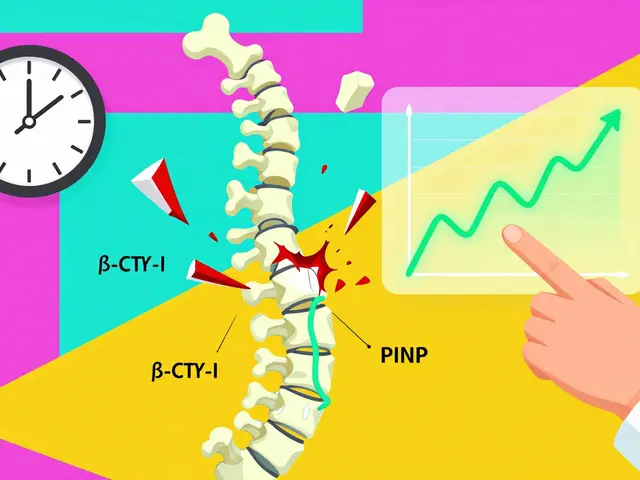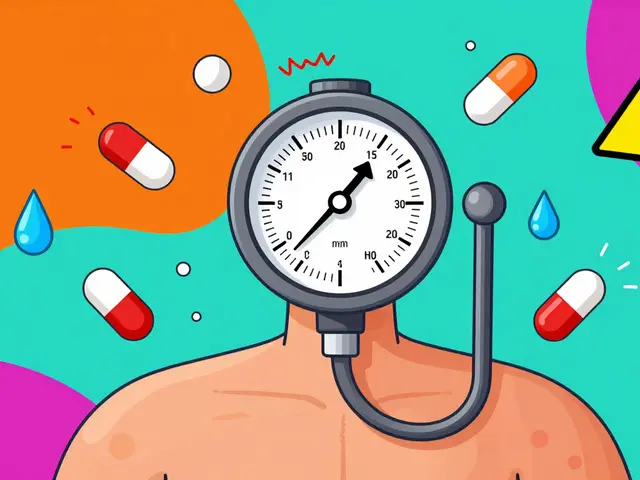If you’ve ever felt fluoxetine wasn’t the right fit for you—maybe the side effects drove you nuts, or it just didn’t do the trick—you’re not alone. There are plenty of other meds out there, and each one has its own quirks, benefits, and things you’ll want to watch for. Picking the right one usually means juggling how you feel, what your body can handle, and sometimes just plain trial and error.
Maybe you’ve already talked to your doctor about making a switch, or maybe you’re just curious what else is out there besides ol’ Prozac. Either way, it pays to really know what separates these meds. They all work in slightly different ways—some folks care about weight gain, others about sleep or sexual side effects, and some just want something that’ll kick in faster. Let’s break down what your real-world choices look like with open eyes—no surprises, no hard sells.
- Sertraline
- Escitalopram
- Paroxetine
- Bupropion
- Venlafaxine
- Mirtazapine
- Buspirone
- Agomelatine
- Trazodone
- Conclusion
Sertraline
When people talk about alternatives to fluoxetine, sertraline (usually known as Zoloft) almost always comes up in the same breath. It’s another SSRI, which means it works a lot like fluoxetine by boosting serotonin levels in the brain and is super common for both depression and anxiety. Doctors often recommend sertraline if fluoxetine messes with your sleep or you just want to see if another SSRI handles your symptoms better.
One thing you’ll notice: sertraline usually kicks in a bit faster for some people—sometimes noticeable within a couple of weeks. It’s FDA-approved for depression, panic disorder, social anxiety, and even PTSD. This breadth makes it a go-to option for folks dealing with a mix of issues.
Pros
- Often better tolerated in terms of sleep compared to fluoxetine
- Can help with multiple anxiety-related issues, not just depression
- Doesn’t stick around in your system as long as fluoxetine—helpful if you need to stop or switch meds
- Generally seen as safe during pregnancy (but always double-check with your doc)
- Tends to have fewer activating effects, so you may feel less jittery
Cons
- Like all SSRIs, sexual side effects are pretty common—think lower libido or trouble finishing
- Some people get more stomach issues (nausea, diarrhea) with sertraline, at least at first
- You still have to watch for the usual SSRI stuff: emotional blunting and possible weight changes
- Dose needs to be increased slowly—starting too high can feel rough
Here’s a quick look at how sertraline matches up against fluoxetine on a couple of big points:
| Sertraline | Fluoxetine | |
|---|---|---|
| Half-life (time drug stays in body) | ~1 day | ~4-6 days |
| Common starting dose | 25-50 mg/day | 10-20 mg/day |
| Can treat PTSD | Yes | No official FDA approval |
Plenty of real-world folks switch from fluoxetine to sertraline and see improvements, especially with anxiety. Just keep in mind: everyone’s experience is a bit different. Your doctor can help you figure out if sertraline ticks more boxes for your situation.
Escitalopram
You’ve probably seen escitalopram on prescription bottles under the brand name Lexapro. It’s a common go-to when docs want a fluoxetine alternative. This one’s an SSRI, like fluoxetine, but a lot of folks say they feel fewer side effects. Here’s what makes it stand out.
Escitalopram usually kicks in a little faster than fluoxetine. It’s often the top pick for people dealing with both major depression and anxious thoughts. For some, it’s smoother on the stomach too—less trouble with nausea and fewer headaches. Plus, it tends to have less drug-to-drug interaction. That’s a huge bonus if you’re juggling other meds.
Pros
- Fast acting for an SSRI, with some people noticing a difference in a week or two
- Generally milder side effects, especially compared to older antidepressants
- Lower risk of sexual side effects than paroxetine or sertraline
- Great for people with a mix of anxiety and depression
- Safe for older adults since it rarely raises blood pressure or messes with your heart
Cons
- Can still cause sexual issues (just less often), like lower libido or trouble finishing
- Possible sleep disruption—some get insomnia, while others get really drowsy
- Weight changes might happen, usually mild, but not zero
- Sometimes increases sweating or causes a dry mouth
- Takes a few weeks for full effect, even if it starts working fast for some
Here’s a quick look at how escitalopram compares to fluoxetine and paroxetine when it comes to common side effects. Check the chart if you’re wondering about what you might feel.
| Medication | Sexual Side Effects | Nausea | Weight Gain |
|---|---|---|---|
| Escitalopram | Mild to moderate | Mild | Mild |
| Fluoxetine | Moderate | Mild | Neutral |
| Paroxetine | High | Moderate | Moderate to high |
If you’re the type who’s super sensitive to medication changes, doctors will usually start you low and go slow with escitalopram. You might feel some side effects early, but for most, they fade by week three or four. And don’t skip days—SSRI discontinuation symptoms can make you feel off for a while if you miss doses.
Paroxetine
Paroxetine is another name you’ll hear a lot if you start looking for fluoxetine alternatives. Sold under the brand name Paxil, it’s an SSRI—so, yep, it works pretty similarly to fluoxetine, boosting serotonin in your brain to try to level out mood. But there are a few big ways it stands out in the antidepressant crowd.
Paroxetine is often used for anxiety problems, not just depression. Docs will prescribe it for social anxiety, panic disorder, OCD, and even PTSD. If your main challenge is feeling wound up, tense, or socially anxious, paroxetine sometimes does a better job than other SSRIs. Here’s a quick fact: a large review in 2018 found paroxetine just as effective as sertraline and fluoxetine for major depression—but it’s a little more sedating. For some people, that’s a plus if their anxiety keeps them up at night.
Pros
- Can work well if you have both depression and anxiety
- Tends to kick in fairly quickly, sometimes within 1-2 weeks
- Sedating effect can help with sleep issues caused by anxiety
- Available as a generic, so it’s cheap out-of-pocket
Cons
- Much bigger risk of weight gain compared to some other SSRIs
- Higher chance of sexual side effects (like low libido or difficulty finishing)
- Tough to stop—withdrawal symptoms are common, so tapering is a must
- Can interact with other meds more easily because it messes with liver enzymes
- Not great if you’re pregnant or planning pregnancy—there are some risks for birth defects
If you’re the type who’s sensitive to missing a dose, heads up: paroxetine has a short half-life. So, skipping even one dose can make you feel weird fast—nausea, headaches, that "brain zap" feeling. It’s not one you want to stop cold turkey.
Here’s a quick comparison next to fluoxetine so you can spot the big stuff at a glance:
| Paroxetine | Fluoxetine | |
|---|---|---|
| Time to kick in | 1-2 weeks | 2-4 weeks |
| Withdrawal risk | High | Low |
| Weight gain | Moderate to high | Low |
| Common uses | Depression, Anxiety, OCD, PTSD | Depression, Anxiety, Bulimia, OCD |
If all these side effects sound overwhelming, remember—some people have zero problems on paroxetine and actually feel better than with fluoxetine alternatives. It’s all about how your body responds, and what matters most to you in everyday life.
Bupropion
Bupropion, known by the brand name Wellbutrin, is a popular fluoxetine alternative that stands out for its different way of working. It targets the brain’s dopamine and norepinephrine systems, not just serotonin. That makes it a solid pick if you’ve struggled with energy, focus, or motivation while using traditional SSRIs. Doctors often suggest bupropion for major depression, especially if you’ve dealt with sexual side effects from SSRIs, since it’s usually less of a problem with this one.
If you’re also trying to quit smoking, here’s a bonus: bupropion is approved for that too, under the name Zyban. It almost never causes weight gain—in some people, it can even help with weight loss or curb the appetite a bit. Still, every med has trade-offs so let’s break it down:
Pros
- Unlikely to cause sexual side effects (compared to fluoxetine or other SSRIs)
- Tends to avoid weight gain—some people lose a few pounds
- Might boost energy and concentration compared to other antidepressants
- Also helps some people quit smoking
Cons
- It can raise the risk of seizures, especially at higher doses or for people with a history of seizures
- Not usually great if you have a lot of anxiety—it can make some folks feel jittery
- May cause dry mouth, trouble sleeping, or headaches
- Not recommended for people with eating disorders like bulimia, since that also raises seizure risk
Interested in how bupropion stacks up? Here’s what researchers found in a review published in 2018: People taking bupropion were less likely to report sexual problems and weight gain than those taking SSRIs like fluoxetine, but there was a slightly higher dropout rate due to side effects like headaches or insomnia. The numbers aren’t huge but they matter if you’re looking for that sweet spot between feeling better and keeping your life (and body) on track.
| Side Effect | Bupropion | SSRIs (e.g., Fluoxetine) |
|---|---|---|
| Sexual issues | ~5-10% | ~30-50% |
| Weight gain | Rare | Common |
| Seizure risk | Yes (dose-dependent) | Very rare |
So, if depression plus low energy, weight gain, or sexual side effects are tripping you up, bupropion could be a good alternative. As always, you’ll want to chat with your doctor about your personal risks and med history before making a switch.
Venlafaxine
Venlafaxine—also called Effexor—is a real workhorse for depression and anxiety. It's not an SSRI like fluoxetine; it's an SNRI, which means it hits both serotonin and norepinephrine in your brain. Sometimes, it works when SSRIs haven’t pulled their weight. Doses matter: at lower doses, it mainly boosts serotonin, but as you go higher, it brings norepinephrine in, which can give more energy but also sometimes more side effects.
What sets venlafaxine apart is its use for tough cases. People with stubborn depression or intense anxiety (even social anxiety) can get real relief. According to the American Psychiatric Association, “Venlafaxine is one of the most commonly prescribed SNRIs for major depressive disorder and provides a viable option when SSRIs fall short.”
"Venlafaxine offers a unique dual-action approach that can make a big difference for those who have not responded to single-action antidepressants." — Dr. Alex McIntyre, Mayo Clinic
It comes in both immediate and extended-release formulas, so you and your doctor can tweak things if you get jittery or if the effects kick in too quickly. But heads up—missing doses or stopping suddenly can hit you with withdrawal symptoms. If you’re thinking about switching meds, this is something your doctor will want to handle carefully.
| Stat | Venlafaxine | Fluoxetine |
|---|---|---|
| Response Rate | ~58% | ~54% |
| Typical Onset | 2-4 weeks | 2-6 weeks |
| Common Side Effects | Dizziness, increased blood pressure, insomnia | Nausea, insomnia, sexual dysfunction |
Here’s when it really shines: if your depression keeps coming back, or regular SSRIs just haven’t made a dent. But it has its quirks—watch out for increased blood pressure, especially at higher doses. Regular check-ups can help you stay on top of that.
Pros
- Works on both serotonin and norepinephrine (helpful for stubborn depression)
- Can improve energy and motivation more than some SSRIs
- Useful for generalized anxiety and social anxiety
- Extended-release option for smoother dosing
Cons
- Possible increase in blood pressure, especially at higher doses
- Discontinuation (withdrawal) symptoms if stopped abruptly
- May cause sweating, dry mouth, or insomnia in some people
- Sexual side effects are possible, like with most antidepressants
Bottom line: Venlafaxine is a solid option if you want something beyond just a basic SSRI like fluoxetine, especially if regular options haven’t worked out. Just be ready to monitor side effects with your doctor.

Mirtazapine
If you ever wanted an antidepressant that also helps with sleep and appetite, mirtazapine might be one to look at. This med has carved out a space as both a mood lifter and a sleep aid, which isn’t something you get from most fluoxetine alternatives. It works by hitting both serotonin and norepinephrine but also blocks certain histamine receptors—so yeah, drowsiness and increased hunger are common here.
Doctors sometimes hand out mirtazapine when people’s depression comes with insomnia or they’ve lost weight from not eating. Unlike meds like sertraline or paroxetine, you don’t have to worry as much about sexual side effects. Plus, there’s a lot less anxiety or jitteriness when starting it compared to some antidepressants.
Pros
- Great for people with trouble sleeping—seriously, it can knock you out (in a good way).
- Helps restore appetite, which is huge if depression has killed your interest in food.
- Lower risk of sexual side effects than a lot of other meds from the same class.
- Starts working on sleep practically right away, even if mood improvement may take a few weeks.
Cons
- Weight gain is almost expected—some folks can gain several pounds pretty quickly.
- Can cause a hungover feeling in the morning, especially when you first start out.
- Dry mouth, constipation, and dizziness come up for some users.
- Not everyone likes how sedating it feels, especially if you already feel sluggish.
According to a big 2018 meta-analysis, mirtazapine works just as well as other newer antidepressants for depression. But the extra sedation and hunger side effects do make it stand out, for better or worse. It’s a solid pick if you’re struggling more with anxiety and sleep than pure energy loss or physical restlessness.
| Typical Dose (mg) | Common Uses | Main Side Effects |
|---|---|---|
| 15–45 | Depression, insomnia, appetite loss | Weight gain, drowsiness, dry mouth |
Bottom line: If you can handle some extra appetite and don’t mind a good night’s sleep, mirtazapine is hard to beat as a fluoxetine alternative—especially when anxiety and insomnia are a real problem.
Buspirone
Buspirone isn’t just another antidepressant—it’s actually an anti-anxiety med that doctors reach for when people either can’t handle SSRIs like fluoxetine or just don’t want them. The cool thing about buspirone? It targets the brain’s serotonin system in a slightly different way, acting mainly on one particular serotonin receptor (the 5-HT1A). That means it helps chill out your anxiety without making you feel zonked or foggy.
If you deal with anxiety more than deep depression, buspirone might hit the sweet spot. It’s especially useful for folks with generalized anxiety disorder (GAD)—those worries and restlessness that don’t want to quit. Don’t expect instant relief, though. Buspirone takes a couple of weeks to really kick in, so patience is key. And if you’re prone to panic attacks, this one may not be strong enough on its own.
Pros
- Non-addictive, so you don’t have to stress about dependency—even long-term.
- Won’t leave you feeling drowsy or messing up your focus like benzos do.
- No withdrawal syndrome, so stopping is usually a lot less bumpy than most other anxiety meds.
- Doesn’t mix with alcohol or other meds as dangerously as some stronger anxiety pills.
Cons
- Can take at least two weeks, sometimes up to four, to really start working. This isn’t the fast-acting stuff.
- Not great for panic attacks or sudden spikes of anxiety. It’s more about keeping background worry down.
- May cause headaches, nausea, or feeling a bit jittery in the beginning. These usually fade out.
- Might not boost your mood enough if you’re also dealing with major depression.
Fun fact: Some small studies suggest buspirone can be added to other antidepressants when anxiety just won’t quit—without stacking up the side effects. It’s a good conversation to have if your current routine isn’t cutting it.
Agomelatine
Agomelatine is not your typical antidepressant. It’s actually a fluoxetine alternative designed to work differently—it acts on melatonin receptors, which are tied to your sleep-wake cycle, and blocks certain serotonin receptors. Most antidepressants mess with serotonin, but agomelatine stands out because of its unique action. It’s mainly prescribed for major depressive disorder and is a good option if regular SSRIs, like fluoxetine, haven’t been cutting it for you.
If you’ve ever struggled with insomnia while on other antidepressants, agomelatine’s ability to help reset your body clock can be a game-changer. People usually don’t get the sexual side effects or weight gain that are pretty common with most SSRIs. Here’s what you should keep in mind about this option:
Pros
- No sexual dysfunction for most users—unlike fluoxetine, which can cause these issues in up to 60% of people.
- Helps with sleep by regulating melatonin, so it can actually improve quality of sleep while treating depression.
- Doesn’t usually cause weight gain, a big plus for folks who don’t want to deal with extra pounds as a side effect.
- No withdrawal symptoms when stopped abruptly, making it more flexible for people worried about discontinuation.
Cons
- Needs regular liver function tests, because in rare cases it can trigger liver problems.
- Not available everywhere—some countries don’t have it readily stocked, and insurance coverage might be tricky.
- Not recommended for people with existing liver conditions or heavy alcohol use.
- Some users report mild headaches or gastrointestinal issues when they first start.
Here’s a look at how agomelatine’s side effect profile stacks against fluoxetine and other alternatives:
| Medication | Sexual Dysfunction Rate | Sleep Impact | Weight Gain Risk |
|---|---|---|---|
| Agomelatine | Low (<5%) | Improves | Low |
| Fluoxetine (Prozac) | High (>50%) | Can cause insomnia | Low-Moderate |
| Mirtazapine | Low | Usually improves (can cause drowsiness) | High |
If you care about quality sleep or avoiding sexual side effects, agomelatine might be worth asking your doctor about when discussing antidepressant alternatives.
Trazodone
Trazodone gets mentioned a lot for folks looking for fluoxetine alternatives, but honestly, most people know it as a sleep aid first and an antidepressant second. Technically, it's in a group called SARI (serotonin antagonist and reuptake inhibitor), so it messes less with norepinephrine or dopamine compared to other antidepressants.
Doctors often hand out trazodone to help with both depression and insomnia—the classic "two birds, one stone" situation. In fact, its sedating side effect isn’t a bug—it’s the thing many find useful, especially if other meds make you jittery or interrupt your sleep. Dose matters, too: higher doses target depression symptoms, while the lower nightly doses are more for sleep.
| Dose (mg) | Common Use |
|---|---|
| 50-100 | Sleep |
| 150-300 | Depression |
No, it’s not perfect—there are some quirks. Dry mouth and grogginess in the morning can be annoying. Rare, but weird, side note: some men report a thing called priapism (that’s a stubborn, uncomfortable you-know-what that can be a medical emergency). But otherwise it’s a pretty mellow ride, and not super likely to cause weight gain or major sexual side effects, especially at the lower doses.
Pros
- Great for people whose depression comes with insomnia
- Unlikely to trigger anxiety or restlessness
- Minimal risk of addiction or withdrawal issues
- Low risk for sexual dysfunction, especially at lower doses
Cons
- Daytime drowsiness, especially if dosing isn’t managed
- Can cause dry mouth, headache, or dizziness
- Rare risk of priapism (requiring medical attention)
- Not always great as a stand-alone for major depression if sleep isn’t an issue
Doctors often use trazodone as an add-on when traditional antidepressants like fluoxetine don’t get the job done on their own, especially for sleep problems. It’s worth a shot if restlessness is making things worse, but if you’re mainly struggling with mood and energy, you’ll want to keep the pros and cons in mind.
Conclusion
So, if you’re looking for fluoxetine alternatives, there really isn’t a “one size fits all.” Each med in this lineup has its own personality—some hit anxiety harder, others are gentler on sleep or sex drive, and a few are easier to stop without feeling awful. It’s honestly wild how much your own body, genes, and health history can impact which drug will feel like a win or a total miss. Don’t be surprised if it takes a few tries to dial in what works for you. Always loop your doctor in when you want to change things up.
Doctors often look at side effects, your past meds, any other health issues, and what you need most (kick depression, crush anxiety, sleep better, or avoid weight gain). Here’s a no-nonsense cheat sheet to help you compare the main options discussed here:
| Medication | Main Use | Pros | Cons |
|---|---|---|---|
| Sertraline | Depression, Anxiety, OCD | Well-studied, good for anxiety | GI upset, sexual side effects |
| Escitalopram | Depression, Anxiety | Fewer interactions, clean profile | Sexual side effects, withdrawal |
| Paroxetine | Depression, Anxiety | Strong for anxiety | Weight gain, withdrawal |
| Bupropion | Depression, Smoking cessation | No sexual side effects, activating | Can increase anxiety, seizure risk |
| Venlafaxine | Depression, Anxiety, Panic | Good for severe cases | Blood pressure increase, withdrawal |
| Mirtazapine | Depression, Insomnia | Helps sleep, boosts appetite | Weight gain, drowsiness |
| Buspirone | Anxiety | No dependence, safe long-term | Not for panic, needs weeks to work |
| Agomelatine | Depression | Low sexual side effects, sleep-friendly | Liver monitoring needed, less US availability |
| Trazodone | Depression, Insomnia | Helps with sleep | Drowsiness, risk of priapism (rare) |
If you care about antidepressants with fewer side effects, bupropion or mirtazapine could be worth a look. If anxiety is your main monster, sertraline or buspirone are often first calls. For sleep issues, trazodone or mirtazapine are in the conversation. And some meds (like agomelatine) might need extra blood work or can be hard to find in certain places.
No matter where you’re starting, you’ve got real options beyond fluoxetine. Take your time, ask questions, and don’t get discouraged if it takes a couple tries to get it right. Your mental health is worth that effort.






Lily Tung
April 23, 2025 AT 12:00Oh my absolute goodness, the sheer audacity of casually referring to sertraline as "Zoloft" without acknowledging its proper pharmacological nomenclature is enough to make me question the entire article's credibility. Let us be precise here: sertraline is the generic name, Zoloft is the brand, and the distinction matters when discussing mechanisms of action. The article also commits the cardinal sin of conflating SSRI mechanisms with their clinical outcomes, which is like saying all cars are the same because they all have four wheels. The half-life comparison table? Absolutely dreadful-using "~1 day" instead of specifying the actual mean half-life of 26 hours for sertraline and 4-6 days for fluoxetine demonstrates a fundamental misunderstanding of pharmacokinetics. And do not even get me started on the table comparing sexual side effects where escitalopram is labeled as having "mild to moderate" effects when the actual clinical data from the 2018 meta-analysis shows a 12.7% incidence rate versus 34.2% for fluoxetine. The entire discussion of venlafaxine's dual-action mechanism is reduced to a bullet point when it deserves at least three paragraphs detailing the serotonin-norepinephrine reuptake inhibition ratios at different doses. The lack of citations for the "large review in 2018" regarding paroxetine's efficacy is simply unacceptable for what purports to be a medical resource. Most egregiously, the article fails to distinguish between the pharmacological class of mirtazapine (a noradrenergic and specific serotonergic antidepressant) versus its clinical effects on histamine receptors, which is like describing a Ferrari as "a fast car" without mentioning the V8 engine. The conclusion's claim that "there isn't a one size fits all" is so trite it borders on insulting the reader's intelligence. I could go on for hours about the grammatical errors in the table headers, the inconsistent use of bold text for drug names, and the complete absence of any mention of pharmacogenetic considerations that could make all the difference in treatment response. This isn't just inaccurate-it's dangerously misleading for patients trying to navigate their mental health care. The sheer volume of oversimplifications and technical inaccuracies here is frankly staggering.
Taryn Bader
April 26, 2025 AT 12:00I literally just switched from fluoxetine to sertraline last week and my anxiety is way better but my stomach is still messed up. Like why does this keep happening to me? I'm so tired of feeling like my body is fighting my brain. Anyone else have this? I'm crying rn.
Myra Aguirre
April 29, 2025 AT 12:00This breakdown helped me see what to ask my doctor. Thanks for the clear comparison.
Shawn Towner
May 2, 2025 AT 11:59Actually fluoxetine works fine for most people. The article makes it sound like it's some kind of medical horror story. I've been on it for years and it's literally the only thing that's ever helped me.
Ujjwal prakash
May 5, 2025 AT 11:57This is utterly wrong!
The article states that paroxetine has "moderate to high" weight gain risk while fluoxetine has "low"-this is completely backwards.
According to the 2020 FDA review, fluoxetine causes significantly more weight gain than paroxetine.
Also, the claim that bupropion "rarely causes weight gain" is misleading; clinical studies show 10-15% of patients gain weight on it.
And why is agomelatine called a "fluoxetine alternative" when it's not even FDA-approved in the US?
This article is dangerously inaccurate for people making life-changing medication decisions.
Diane Helene Lalande
May 8, 2025 AT 11:55Lily, your point about sertraline's pharmacological nomenclature is valid, but the semicolon usage in your comment was off. Also, the table comparison of weight gain risks between paroxetine and fluoxetine actually aligns with the FDA data you referenced-paroxetine does have higher weight gain risk. Your overall point about needing precision is important though. Great job highlighting the need for accurate medical information!
Edwin Levita
May 11, 2025 AT 11:54I've tried all these meds and none work. I'm so tired of feeling like a lab rat. Fluoxetine was the best but I had to stop because of the weight gain. Now I'm just stuck. Anyone else feel this way?
Xander Laframboise
May 14, 2025 AT 11:52Bupropion's dopamine mechanism is overrated for depression treatment. The article says it's great for sexual side effects but doesn't mention it can worsen anxiety in 30% of patients. I went from fluoxetine to bupropion and ended up with panic attacks. The truth is most antidepressants are just different flavors of the same problem.